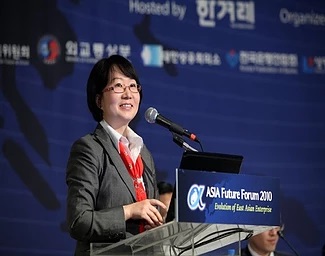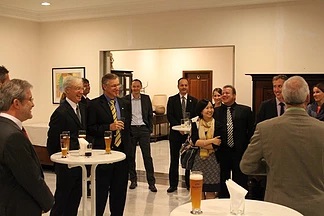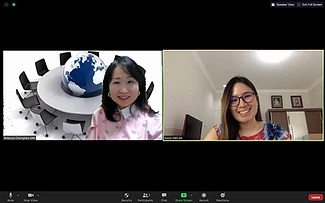Kim Rebecca ChungHee, born in South Korea, is a professor of International Management at APU. She finished her Master in Management (MIM) and Ph.D. in Management Research at Strathclyde, United Kingdom. She is a recipient of the British-Chevening Scholarship for her MIM as well as a full-time three-year scholarship for her Ph.D. in Management program. Professor Rebecca started her career working in an embassy, then moved on to work at a government-affiliated organization, NPO, and CSR consulting firm
before teaching at Strathclyde University UK, Edinburgh University UK, University of Nottingham Malaysia, and finally Ritsumeikan Asia Pacific University Japan.

Online teaching
The spring 2020 semester has been different for Professor Rebecca, as she finished her sabbatical leave of the previous semester only to be faced with a global pandemic upon getting back to work. The policy of APU has asked Professor Rebecca to teach students virtually online. As a result, she reformulated her teaching methods. Preparation for online teaching is not so different from face-to-face teaching because both have similar teaching content. However, Professor Rebecca found that according to the Harvard Business Research, online teaching is more difficult for seventy to eighty percent of teachers because it presents more communication difficulties; students tend to communicate less and teachers are not able to understand student responses as easily online. For this reason, delivery and approach are very important when conducting online teaching. For example, one technique for engaging for group work is having break-out rooms (one of the features in Zoom) as it allows smaller discussions during online classes. Moreover, according to Professor Rebecca, being open-minded, by sharing photos and videos to appeal visually to student, is crucial for helping students relax and enjoy interacting online. A student's emotional condition during the current pandemic has a large impact on their studies, especially considering there are many students in Beppu who must undergo self-quarantine alone and far from their families back in their home countries.
Professor Rebecca has had to change not only her method of teaching but also how she assesses her classes. Since a stable Wi-Fi connection and academic integrity are both crucial to their execution but cannot be guaranteed, Professor Rebecca has eliminated final exams. Instead, she now administers a weekly critical reflection based on particular topics given in class lectures. Professor Rebecca endeavors to maintain group work as a final project since she has a firm belief that it is one of the key features of multi-cultural collaborative learning.
WFH (Work from home)
Professor Rebecca is currently doing a hybrid working method, meaning that she works in two places: her office on campus and her home. For online teaching, she usually works from her office. When doing research, she works from home or office according to the requirement of the research. For Professor Rebecca, whether working from home or the office, there are no distinct differences in terms of sociocultural interactions with her peers (other professors) because scholarly work like research and class preparation are usually done individually.

APU, as an institution encourages its international and Japanese stakeholders to mingle, is one of the leading international universities in Japan. Despite present challenges, APU sees value in bringing international culture and traditional Japanese culture together. These are the reasons why Professor Rebecca respects APU’s valuable mission and chose to work at APU. The emergence of remote working in Japan during this pandemic has become more widespread, and this, according to Professor Rebecca, has made trust even more important. Employers must trust employees and vice versa to work effectively and continue to boost productivity. An employee’s outcome should be assessed rationally, and their employer should be transparent and rigorous in regards to assessment criteria.
Furthermore, an employer should assess employees based on the outcomes they produce. As stated by Professor Rebecca, to support these new working methods, organizations must establish a win-win situation and use concrete assessment as a tool for motivation. This applies not only to teachers or employees but also to students who are required to work and think harder in online classes. As academic staff, Professor Rebecca sees how trust is gained and experienced at APU at faculty meetings. During faculty meetings, faculty members are willing to share their opinions as they determine the pros and cons of hybrid learning as well as solutions for the upcoming semester.
Throughout this new normal, which has triggered huge changes in society, Professor Rebecca suggests students to take on a positive perspective of the pandemic by learning from both the shortcomings and successes of business and political leaders in society. By paying attention to the mistakes that leaders pass on, students as global citizens can acquire knowledge and use it to make the world better as a future leader. “Shape your World” is APU’s tagline, yet Professor Rebecca goes one step further and inspires students and peers to “Shape your World Ethically and Responsibly.”

Abigail Kezia
Hey readers! This is Kezia from Indonesia and I am currently an 8th semester student majoring in Strategic Management and Organization. It's been a tough year experiencing this new normal, going hand-in-hand with the pandemic. However, as the APU community that pursues shaping the world, we are all in this together, never apart, maybe in distance, but never in heart. Let's keep in touch virtually through SPA's blog.













